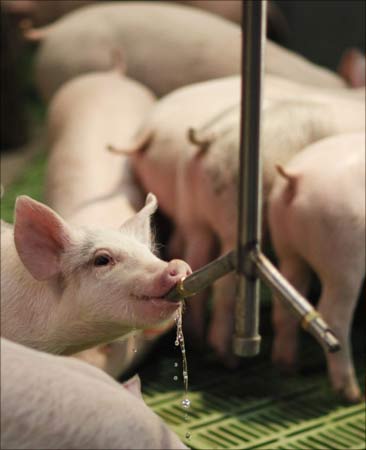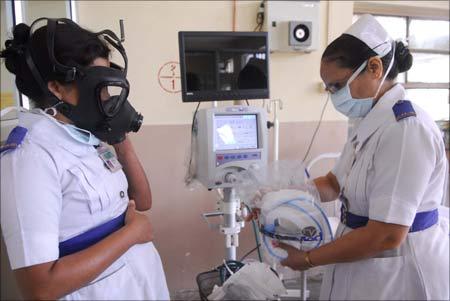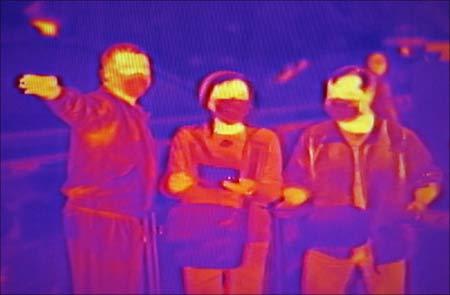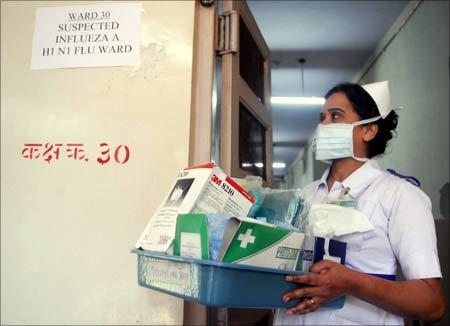Photographs: Johannes Eisele/Reuters
Unlike avian influenza (bird flu), which killed thousands of birds before it began to affect human beings, swine (pig) flu has killed over 175 human beings without killing even a single pig.
In fact, since the beginning of the current epidemic that has created panic the world over, there hasn't been a single confirmed case of any swine suffering from it. This is despite the fact that different forms of swine influenza viruses remain in circulation almost all the time throughout the world.
The pigs are safe
Image: A nurse wearing a mask at a Mumbai hospital.Photographs: Arun Patil
"The Indian livestock sector need not fear at all as Indian pigs are not suffering from this disease and there are remote chances of them catching it," asserts Dr K M Bujarbaruah, deputy director-general (animal sciences) of the Indian Council of Agricultural Research.
Indian pigs are also safe because the H1N1 strain that has caused the current epidemic is not present in India and, in fact, has seldom been there.
The pigs are safe
Image: A thermal scanner shows an image of a health officer wearing a face mask assisting passengers also wearing face masks at Kuala Lumpur International Airport in Sepang.Photographs: Bazuki Muhammad/Reuters
ICAR's animal scientists rule out the chances of incoming passengers, or anyone else, introducing the swine flu virus in India because the virus will not be able to survive in the present summer heat and aridity.
There are no chances of the virus getting a foothold in the country before the onset of winter in November, they maintain.
However, as a precautionary measure, steps have already been taken to monitor pigs in India to ensure early detection of the infection, if at all it surfaces here. Slaughtered pigs are being tested to detect the presence of any swine flu antibodies in their flesh.
The pigs are safe
Image: An airport staff member wears a mask to protect himself from the outbreak of swine flu as he cleans the floor at the International airport in New Delhi.Photographs: An airport staff member wears a mask to protect himself from the outbreak of swine flu as he cleans
Pigs, in any case, account for only a small fraction of the country's total livestock population. Nearly one-fourth of the total pig population of India is in the north-east, where pork consumption is in vogue.
Elsewhere, only small numbers of pigs are present, that too largely in Uttar Pradesh, Bihar, Jharkhand, Andhra Pradesh, Kerala and Tamil Nadu. Organised sector pig-rearing is confined chiefly to Kerala, Bihar and Jharkhand.
Pigs reared in the backyards of homes are relatively sturdier and safe from diseases like influenza. Besides, these animals are regularly slaughtered, which results in quick replacement of the population.
The pigs are safe
Image: The statue of Diana wears a surgical mask in Acapulco.Photographs: The statue of Diana wears a surgical mask in Acapulco.
In the organised sector, too, mortality from swine flu is almost unheard of in India because the disease is effectively controlled through common antibiotic drugs.
Still, Dr Bujarbaruah recommends a four-pronged strategy to keep this malady at bay. It involves
- Protecting pigs from getting the infection through bio-safety measures like movement-control and disinfection of pig farms;
- Upgradation of the facilities at the Bhopal-based high security disease diagnostic laboratory;
- Preventing any transmission of infection from pigs to human beings through bio-safety measures for pig-farm-workers; and
- Preventing human-to-human transmission of infection through speedy detection, isolation and treatment of potential carriers of the virus.
The pigs are safe
Image: Passengers submit their health information forms at a medical check-up counter at the International airport in New Delhi.Photographs: Adnan Abidi/Reuters
Indeed, a unique feature of the H1N1 (swine flu) virus is that it is more fatal in the case of human beings than it is in the case of pigs. In fact, the mortality rate among pigs due to this virus is rather low throughout the world.
Besides, vaccines are available to protect them from this virus. But these vaccines do not work in the case of human beings; nor do the vaccines available for warding off common human influenza work in this case.
In fact, ICAR scientists feel that the routine use of vaccines by people against common viruses of influenza in countries like Mexico and the US might have contributed to creating conditions conducive for the flu viruses to mutate into forms that can cause human pandemic.
The pigs are safe
Image: A nurse carries masks and medicine outside the influenza A (H1N1) ward in Mumbai.Photographs: Stringer/Reuters
The H1N1 virus actually resembles not only the common swine flu viruses but also resembles the bird flu and human viruses and has characteristics common to all of these. That makes it truly dreadful and even fatal.
The three most-prevalent strains of human influenza are referred to as types A, B and C. Of these, while types A and C can affect both pigs and human beings, type B does not affect pigs. The present evolved form of H1N1 influenza virus belongs to type A. The other swine flu viruses that have spread in different parts of the globe are H2N1 and H3N2.
The bottomline, thus, is that while the swines, whose name has needlessly got associated with this ailment, are relatively safe as of now, human beings do run the risk of facing a potential pandemic.








article